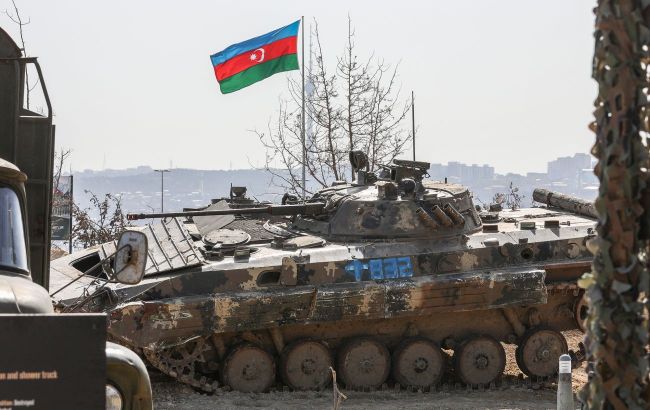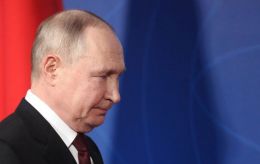Nagorno-Karabakh escalation: All details on Azerbaijan-Armenia conflict
 Photo: Nagorno-Karabakh conflict escalates between Azerbaijan and Armenia (Getty Images)
Photo: Nagorno-Karabakh conflict escalates between Azerbaijan and Armenia (Getty Images)
Today Azerbaijan announced launching "local anti-terrorism measures" in unrecognized Nagorno-Karabakh. Baku considers the withdrawal of Armenian troops from the region as the only solution to the situation, while Yerevan claims it does not want to engage in warfare.
What is known about the escalation of the Azerbaijan-Armenia conflict - read below on RBC-Ukraine.
What is the reason for escalation this time
Today, information appeared on social media about the supposed massive shelling of Stepanakert (the capital of the unrecognized Nagorno-Karabakh Republic), its outskirts, and other settlements in Nagorno-Karabakh.
Later, the Ministry of Defense of Azerbaijan officially announced that they had initiated military operations in parts of Nagorno-Karabakh. Baku referred to them as "local anti-terrorism measures" and demanded that Yerevan completely withdraw its troops from the region and dissolve the government of the unrecognized republic (Artsakh).
According to Azerbaijan's version, the trigger for the military action was the shelling of positions by the Armenian Armed Forces in Karabakh, mining in the region, and the strengthening of Armenia's fortifications.
However, the specific incident cited as the cause of escalation was the explosion of a vehicle of the Azerbaijan State Agency for Automobile Roads on the Ahmedbeyli-Fizuli-Shusha highway on September 19. According to Baku's information, both civilians and military personnel were killed.
The Ministry of Foreign Affairs of Azerbaijan reports that the "anti-terrorism measures" were a response to a "series of large-scale military provocations and terrorist acts" by Armenian forces.
The ministry also claims that the increasing tension over the past months was caused by the systematic shelling of Azerbaijani positions by Armenian armed formations in the Karabakh region, engineering work on fortified positions, and an increase in the number of trenches and bunkers.
Later, the Azerbaijani authorities set a condition for ending the "anti-terrorist operation" in Nagorno-Karabakh - Armenian forces in the region must surrender.
"To end the anti-terrorism measures, illegal Armenian armed formations must raise a white flag, surrender all weapons, and the illegal regime must self-dissolve," the statement said.
What is known about the situation in Karabakh
Information appears online that Stepanakert is under artillery shelling by Azerbaijani forces. It was also reported that sirens were heard in the city and there were communication problems.
The media reports that fire is being returned from Armenian positions in Karabakh. Meanwhile, the official statement from the Armenian Ministry of Defense claims that their troops are supposedly not in the region.
However, videos of Azerbaijani Armed Forces hitting Armenian Tor air defense systems are already posted, as well as videos on destroying Armenian Armed Forces electronic warfare systems.
There is also information available that columns of military equipment from the Azerbaijani army are reportedly moving towards the region.
Baku itself officially says to be targeting only military facilities of Armenian units with precision weapons but still calls on the civilian population of the region to evacuate through a humanitarian corridor via the Lachin road, as Armenian military personnel stations near residential neighborhoods.
Armenian media and bloggers report the shelling of civilian facilities in Stepanakert (Khankendi) and destruction, but the Azerbaijani side denies it.
Meanwhile, footage of the aftermath of the residential building shelling in the capital of the unrecognized Karabakh has already begun spreading online.
(twitter.com/GeghamArtsakh)
Additionally, there is information about alleged casualties and injuries. The Ombudsman of the unrecognized republic, Gegham Stepanyan, reported at least two deaths and 23 civilian injuries as a result of the shelling.
Pashinyan calls for Security Council meeting
Initially, the Armenian Ministry of Defense reported that "everything is calm" along the country's borders, while Azerbaijan was supposedly spreading "disinformation."
However, later, Armenian Prime Minister Nikol Pashinyan urgently called for a meeting of the Security Council.
.jpg)
Photo: Armenian Prime Minister Nikol Pashinyan urgently called for the Security Council (Getty Images)
"Armed Forces of Azerbaijan began shelling the entire territory of Nagorno-Karabakh with missile and artillery means, after which they started actions to break through the Line of Contact and gain control over positions and settlements," the media cited Pashinyan after the meeting.
He specifically accused Azerbaijan of initiating a so-called "ground operation for ethnic cleansing of Armenians from Nagorno-Karabakh" and added that there are supposedly no Armenian military personnel in the region.
Will Russia help Armenia?
Notably, the new escalation in unrecognized Karabakh began against the backdrop of disputes between Yerevan and Moscow. Earlier, Armenia withdrew its representative from the Collective Security Treaty Organization, opting out of joint exercises.
Moreover, Prime Minister Pashinyan recently called Armenia's dependence on Moscow for arms supplies and security "a strategic mistake" in an interview with La Repubblica.
As for Russia's immediate reaction to the escalation between Yerevan and Baku, it seems relatively restrained. The Russian Foreign Ministry called on the parties to "cease fire" and to seek a "diplomatic resolution of the situation."
The Russian Foreign Ministry also says that Moscow is not pleased with Armenia's statements "that anti-Russian steps do not affect bilateral relations." Thus, Moscow seems to be critical of Armenia's military cooperation with the United States (referring to joint military exercises).
Protests in Yerevan
Meanwhile, an impromptu rally is forming in the center of Yerevan. Protesters chant "Nikol is a traitor!" and "Artsakh!" Dissatisfied protesters have also blocked Tigran Mets Avenue near the government building in the city center. They demand "concrete steps" from the government.
How world reacts
Türkiye
The defense ministers of Azerbaijan and Türkiye held a phone conversation, during which the Turkish minister expressed full support for Azerbaijan's actions.
France
France is demanding an urgent meeting of the UN Security Council in response to the shelling in Nagorno-Karabakh.
The French Ministry of Foreign Affairs notes that France "strongly condemns Azerbaijan's initiation of a military operation in Nagorno-Karabakh" and calles on Baku to immediately cease hostilities.
"No pretext can justify such unilateral actions that threaten thousands of civilians who have already suffered from a months-long illegal blockade and undermine international efforts to achieve a settlement through negotiations," said the statement from the French Ministry of Foreign Affairs.
European Council
President of the European Council Charles Michel also called on Azerbaijan to immediately cease hostilities.
"The military actions by Azerbaijan must be stopped immediately to allow for genuine dialogue between Baku and the Armenians of Karabakh," Michel says.
At the same time, the EU Special Representative also called for an immediate ceasefire in Nagorno-Karabakh.
"Today, tragic reports have come in about the deaths of Azerbaijanis due to mine explosions. However, the ongoing military actions will only exacerbate the situation. There is a need for an immediate ceasefire to ensure genuine dialogue between Baku and the Armenians of Karabakh as the only way to achieve peaceful coexistence," wrote the EU Special Representative for the South Caucasus and the crisis in Georgia, Toivo Klaar, on social media.
War for Karabakh
The war for Nagorno-Karabakh has been going on for nearly three decades.
At the time of the Soviet Union's dissolution, this historical region within the Azerbaijani SSR was predominantly inhabited by Armenians. Therefore, in 1991, with the support of Armenia, the region declared "independence" and named itself the Nagorno-Karabakh Republic.
As a result of the First Nagorno-Karabakh War (1992-1994), a part of the region's territory came under the control of the Nagorno-Karabakh Republic.
However, following the conflict in 2020, Azerbaijan regained control of some territories.
Azerbaijan, like other states worldwide, does not recognize the Nagorno-Karabakh Republic.

